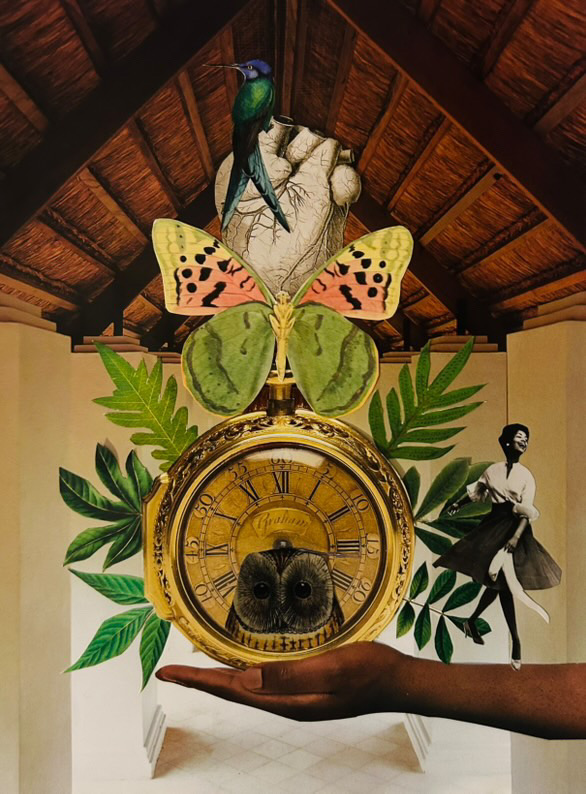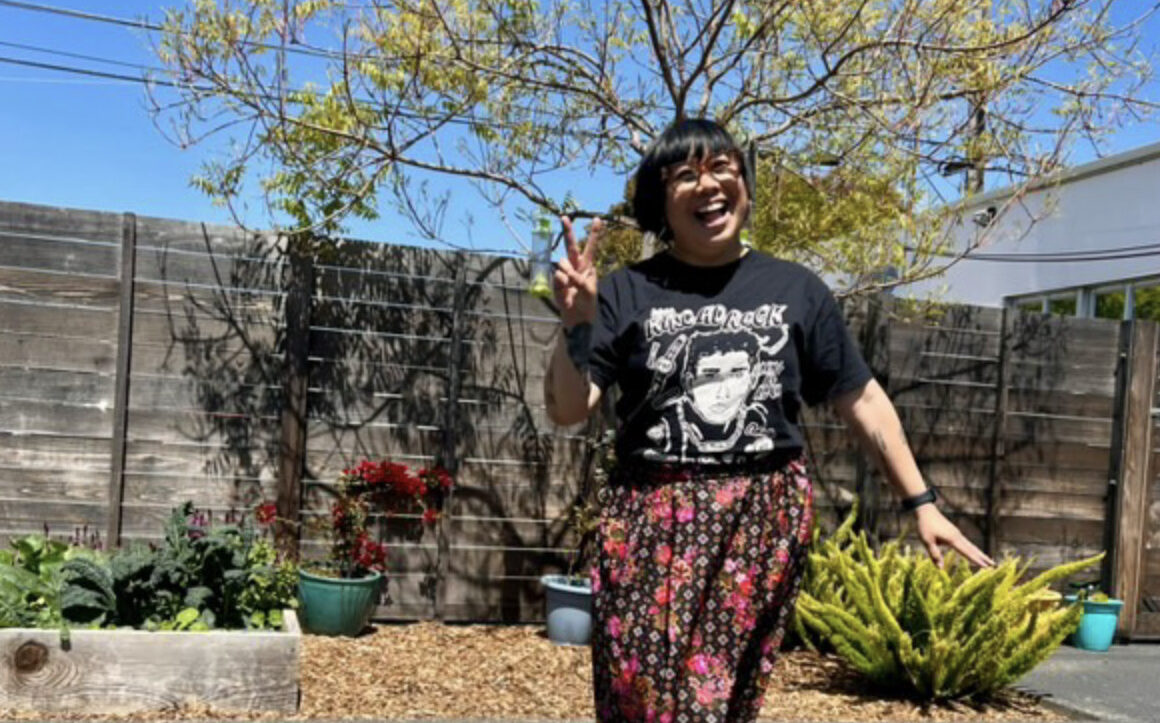Meet Marie, an artist and community member whose sobriety journey began just days before the world shut down in March 2020. What started as an indulgent nightlife habit gradually became a private struggle with alcohol and substances—until a moment of brutal honesty and fear for her life sparked a life-changing transformation. Over the last 4.5 years, she’s rebuilt her world with intention, self-love, and resilience. In this interview, she shares the emotional and practical steps she took to get sober, the boundaries that helped her heal, and the wisdom she’s gained from grieving her old life and stepping into a new one. Her story is a powerful reminder that choosing yourself—day after day—is always worth it.

1. What was your relationship with alcohol and substances before sobriety?
I considered myself an indulgent drinker. I always looked forward to Happy Hour after work since the bar was on my way home; everyone would just end up at our neighborhood spot. I loved my whisky neats, menthol cigarettes, substances, and hanging out with friends.
The turning point was when I started to notice I preferred drinking and getting high by myself. In the beginning it was about having fun with friends; toward the end, it was just me in my tiny studio. I’d buy a bottle of whisky or wine, have my baggie, my cigarettes, and stay up late. Most times it was on a weeknight and the weekend was for recovering from running on little sleep and being hungover. I’d run on two hours of sleep and then go to work.
My partner at the time knew about my habits before we started dating. One night, when I was about to do a line in front of him, he stopped me and said, “Why do you do that to yourself? You’re better than that.” That really hit me and made me start evaluating what I was doing.
Toward the end, going to the bar just felt automatic—a habit. I didn’t even like drinking anymore. I could feel my body being affected and it scared me. I never had self-control. I would just keep going, even though I knew I needed to stop. I was also accumulating debt I couldn’t afford—my plug would let me IOU if I didn’t have cash. I honestly don’t remember how I paid it all off.
2. How did you find the courage to be honest with yourself?
It was simple: I didn’t want to have a stroke or die. I kept thinking about dying in my sleep because I had done too many drugs and my heart couldn’t take it. I imagined my family or friends finding me dead in my studio. Those thoughts terrified me. I knew I had to make a serious change.
In the past, I tried to wean myself off, but that never worked. I lied to myself every time I said I could just cut back.
3. How did your support system play a role in your recovery?
I’m very lucky to have the support system I do—family, friends, community. When I decided to go sober on March 3, 2020, I messaged everyone close to me to explain what I was doing and why. I told them I was going to disappear for a while to get better. Everyone was supportive. Most had no idea how serious it had become.
By being honest, I held myself accountable. If they knew what I was going through, they wouldn’t question why I wasn’t drinking. My partner at the time was also a huge support. He quit drinking with me and invited me to stay with him instead of being alone in my studio during lockdown. Even my drinking buddies respected my decision. No one has ever pressured me.
4. What steps did you take to leave your old habits and relationships behind?
I stayed away from bars and distanced myself from my friends. Going out after work had been such a big part of my life. I lived in downtown Oakland, so everything was walkable and spontaneous adventures were easy. But I couldn’t lie to myself anymore. I knew I couldn’t go to the bar and just hang out.
I isolated during the week and spent weekends with my partner. And I watched who respected my boundaries—everyone did. I didn’t feel like I was missing out. I’ve learned people are part of different chapters. Sometimes they stay, sometimes they go. That’s just life.
5. What were the biggest challenges during your transition to sobriety?
Because of the pandemic, we were all isolated. Once gatherings resumed, I was both excited and anxious. My first gathering was with cousins, and they asked if I was okay with alcohol being present. I was.
Later, I met up with friends at our old bar. I felt fine at first, but once people were noticeably drunk, I knew I had to go. I felt left out, uncomfortable, and a little tempted. Even now, I avoid environments unless I know I can leave when I need to.
The biggest emotional tests were losing my brother in 2021 and my dad in 2022. If those losses didn’t drive me back to drinking, I know I can face anything. Sobriety has allowed me to feel everything without numbing myself.
6. How did you practice self-love, patience, and gentleness?
In the beginning, I watched movies, read books, took an anxiety class, and had life coaching and therapy (though the therapist ghosted me after four sessions). I started caring for plants and setting up my home—my mom helped me become a homeowner. As the world reopened, I spent more time with my female friends.
A therapist once told me, “Be gentle with yourself. You are grieving your old life to make room for your new one.” That stuck with me. Now, post-breakup, I’m focusing on myself like never before. Reiki sound baths have helped me stay grounded.
7. How did you navigate social settings after going sober?
I always make sure I’m in control. I drive myself so I can leave whenever I want. I used to set time limits for outings. My first big party was in June 2024—a backyard event with deep house music. It was overwhelming: people drunk, high, smoking. Someone even took out a baggie.
I found a quieter space with friends who understood how I felt. We stayed there, enjoyed the music, and when I was ready to leave, so was my friend. I can handle small gatherings, but big parties? I’m mostly done.
8. What boundaries did you set that helped you during recovery?
I was really lucky. The pandemic helped create boundaries for me: bars were closed, I was furloughed, my partner let me stay with him, and I isolated before the shutdown. I didn’t have to enforce boundaries at the time—they were built in. That made recovery easier.
9. How did you cope with grief over your past life and changed relationships?
A therapist helped me see I was grieving my past life. That perspective helped. The pandemic changed people. When I saw friends going out again, I felt sad, like I was missing out. But many said, “You’re not missing anything.” That made it easier.
I missed the social aspects—sitting at a bar, interacting. But I leaned into my longtime friendships. I still grieve relationships that have changed, especially ones that were meaningful. I try not to be sad when friendships fade. I’m just grateful for the time we had.
10. What advice would you give to someone struggling to be honest with themselves?
You have to get tired of your own bullshit. I was aware enough to know I needed change, but I kept lying to myself, saying I could cut back. Eventually, I got scared. The heart pain from cocaine was the final straw.
I told the people closest to me what was going on. That helped me stay accountable. I was also mentally prepared to disappear for a while and let my lifestyle change. My advice: be honest, write your feelings down, confide in people you trust, find resources, and expect grief. A genuine friend will support you. If they don’t, they’re not your people.
11. How did you manage social discomfort around drinking?
When we started gathering again post-pandemic, I gave myself time limits. Social drinking didn’t bother me, but when people got sloppy drunk, I felt uncomfortable. I always made sure I could leave.
That first party in June 2024 was intense. People were doing everything I used to do. I found a safer space, and my friends stayed with me there. I’ve learned to skip events if I’m not ready. It’s okay to say no.
12. What lessons have you learned about self-acceptance and resilience?
Take it one day at a time. Don’t be hard on yourself—you’re learning a new way to be social. Let yourself feel everything. Boundaries are essential. People who love you will respect them. Those who don’t? Let them go.
I’ve learned to be proud of myself. I can face anything without alcohol or substances. I sit with emotions now. Community matters, but it starts with being brutally honest with yourself. At the end of the day, it’s your life.
13. How do you maintain your mental health and well-being today?
I spend time with people I love at least once or twice a month. Vulnerable conversations remind me I’m not alone. I attend reiki sound baths and local art events. I make art and cry when I need to. I also take short trips every quarter to reset.
14. What’s the most rewarding part of your sobriety journey?
Loving myself. Being patient and giving myself grace. Doing things I’ve always wanted to do: submitting art to shows, curating exhibitions, traveling solo.
I’m pushing through discomfort without alcohol as a crutch. I’m more present. The most rewarding thing has been choosing me.
15. What message would you give to women facing similar challenges?
Take it one day at a time. Be gentle with yourself. You are worth it. Set firm boundaries. Real friends will support you. Sobriety can feel lonely at first. Find support. Be ready to grieve your past, but know the best is yet to come.
It’s not easy. But deciding to quit is the hardest part. Be proud of yourself. It takes immense courage, strength, and love to make this kind of change.






